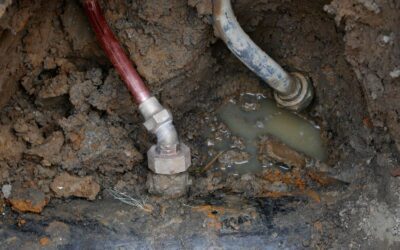
FILE - A work crew digs trenches and lays fiber optic cable near Boulder Junction in August 2022 for expanded high-speed (broadband) internet service. Unlike Boulder Junction, where city funding helped expedite a privately-owned network, Superior's network is city owned for use by multiple private internet service providers. (Image via Evan Pretzer)
Wisconsin’s first publicly-owned, open-access broadband network means competitive pricing and no monopoly ownership of the cables that keep Superior connected.
The city of Superior has found success building out its broadband network, and now the second phase is underway to connect another part of the city to the state’s first publicly-owned, open-access system for high-speed internet.
“We’re two weeks in and it’s already a hit,” Mayor Jim Paine said on Mornings with Pat Kreitlow, powered by UpNorthNews.
An open-access network means any internet service provider can use the fiber optic lines and sell its services to customers.
“We combined what I thought is the best of the political philosophies on the left and the right,” Paine said. “We believe in private sector competition to lower prices and increased innovation. But the public should own the infrastructure. We shouldn’t allow the private sector to control infrastructure that is vital to modern life. And so that’s what we did.”
While Paine’s hopes for a broadband expansion project predate the COVID pandemic, the money to get started on ConnectSuperior started with the White House in 2021.
“Joe Biden, really,” Paine said, referencing the former president, who signed the American Rescue Plan Act (ARPA) into law in March 2021.
“What a lot of people forget,” Paine said, “is that the ARPA dollars, which have been used for so many different things across the country, were primarily meant for utility infrastructure. And the first utility described in that law is access to broadband. And so we just took them at their word and we used it to build a network.”
He added that the pandemic magnified a digital divide affecting families and businesses that he hopes the local project will permanently address.
“The pandemic proved every single argument we made [was] correct. When we had to send people home from work, send children home from school, and they did not have access to the internet, that meant they didn’t go to school,” he said. “We lost a generation of kids that should have been educated and weren’t, because they didn’t have access to this vital public infrastructure.”Two factors have come together to prompt the acceleration of Superior’s original plans: lower-than-expected construction costs to lay the lines and the threat that future funding would be cut by the new administration to fund President Donald Trump’s high-end tax cuts. ARPA funds originally had a spending deadline of Dec. 31, 2026.
“Spent is spent,” Paine told the Superior Telegram. “And once it’s spent, it can’t be clawed back. So, with presidential administrations changing, we wanted to get ARPA money just spent as quickly as possible.”
Paine said success was defined as a 10% rate of potential customers in an area signing up for service by the end of the year—a goal he predicts will be reached by next month.
“And, if we can show real success by the fall of next year, I think we’ll have justified moving quite a bit faster than our original forecast of five to seven years” for completing the network across the entire city.
While Superior’s network is the first in Wisconsin to be municipally owned, other communities, like Boulder Junction, have expedited high-speed internet service by helping fund and attract private providers.
Support Our Cause
Thank you for taking the time to read our work. Before you go, we hope you'll consider supporting our values-driven journalism, which has always strived to make clear what's really at stake for Wisconsinites and our future.
Since day one, our goal here at UpNorthNews has always been to empower people across the state with fact-based news and information. We believe that when people are armed with knowledge about what's happening in their local, state, and federal governments—including who is working on their behalf and who is actively trying to block efforts aimed at improving the daily lives of Wisconsin families—they will be inspired to become civically engaged.


Opinion: The road ahead for environmental protection
The Inflation Reduction Act has made transformative investments in Wisconsin and across the Country. Congress must protect it. Reflecting on my...

Opinion: Celebrating Earth Day during the Year of the Kid
Lieutenant Governor of Wisconsin Sara Rodriguez is celebrating Earth Day and the “Year of the Kid” by calling for bipartisan action to protect the...

Opinion: Caring for our environment is a bipartisan matter
The Inflation Reduction Act (IRA) has benefited rural communities in Wisconsin. It must be kept intact. As a teenager in the early 1970s, I recall...

Opinion: Rolling back climate advances puts America at risk
Transportation Secretary Sean Duffy wants to roll back progress while ignoring the threats to infrastructure and national security from a changing...





